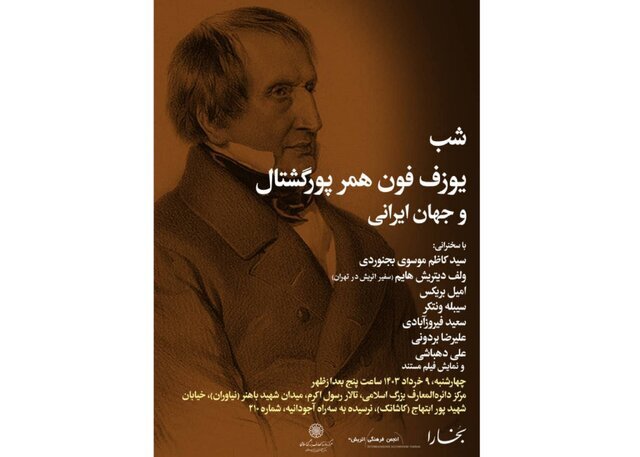Tehran meeting to commemorate Austrian orientalist Joseph von Hammer-Purgstall

TEHRAN- A number of Iranian literati will come together in a session at the Center for the Great Islamic Encyclopedia in Tehran on Wednesday to pay tribute to the Austrian orientalist and historian Joseph von Hammer-Purgstall.
The meeting entitled “An Evening with Joseph von Hammer-Purgstall and the Iranian World” is organized to commemorate 250th birthday anniversary of the celebrated orientalist.
Organized in collaboration with the Austrian Cultural Forum Tehran (Österreichisches Kulturforum Teheran-ÖKFT), the session will be dedicated to the life and works of this great scholar and Iranologist from Austria.
During the event, the importance of Joseph von Hammer-Purgstall as a translator of the Quran and the Divan of Hafez, as well as his participation in publishing and understanding Islamic literature in German-speaking countries, will be highlighted.
The attendees and speakers of the event will include the director of the Center for the Great Islamic Encyclopedia Kazem Mousavi Bojnourdi, Austrian Ambassador to Tehran Wolf Dietrich Heim, the director of the Diplomatic Academy of Vienna Emil Brix, researcher at the Institute of Iranian Studies at Austrian Academy of Sciences Sibylle Wentker and Iranian scholars Saeid Firouzabadi, Alireza Barduni and Ali Dehbashi.
Joseph von Hammer-Purgstall was a prolific writer and scholar, and his works spanned a wide range of subjects. One of his most notable works is his 10-volume "Geschichte des osmanischen Reiches" (History of the Ottoman Empire), published between 1827 and 1835. This monumental work is considered one of the most comprehensive and authoritative histories of the Ottoman Empire.
In addition to his work on the Ottoman Empire, Hammer-Purgstall also wrote extensively on Islamic literature and culture. He was one of the first Western scholars to study and translate Arabic, Persian, and Turkish texts, and his works include translations of Ahmad ibn Ali ibn Wahshiyah's "Ancient Alphabets and Hieroglyphic Characters Explained" and Evliya Efendi's "Narrative of Travels in Europe, Asia, and Africa". He also wrote on the history of Arabic literature, including his seven-volume "Literaturgeschichte der Araber" (History of Arabic Literature), which was left unfinished at the time of his death.
Hammer-Purgstall's works also include several studies on Middle Eastern history and culture. He wrote about the history of the Golden Horde in Kiptschak, as well as the Ilchane dynasty in Persia. He also wrote about the history of Constantinople and the Bosporus, and published a comprehensive history of the Ottoman Empire's administrative system.
In addition to his historical and literary works, Hammer-Purgstall also wrote about travels and geography. He published accounts of his own travels, including "Umblick auf einer Reise von Constantinopel nach Brussa und dem Olympos" (View from a Journey from Constantinople to Brussa and Olympus), and wrote about the geography and culture of the Middle East.
Finally, Hammer-Purgstall also wrote about the history of Islamic mysticism and Sufism. He published a comprehensive study of the Assassin sect, which was based on his own research and translations of primary sources.
Overall, Joseph von Hammer-Purgstall's works are a testament to his vast knowledge and expertise in Middle Eastern history, literature, and culture. His writings continue to be studied by scholars today, and provide a valuable window into the intellectual and cultural landscape of Europe during the 19th century.
SAB/
Leave a Comment